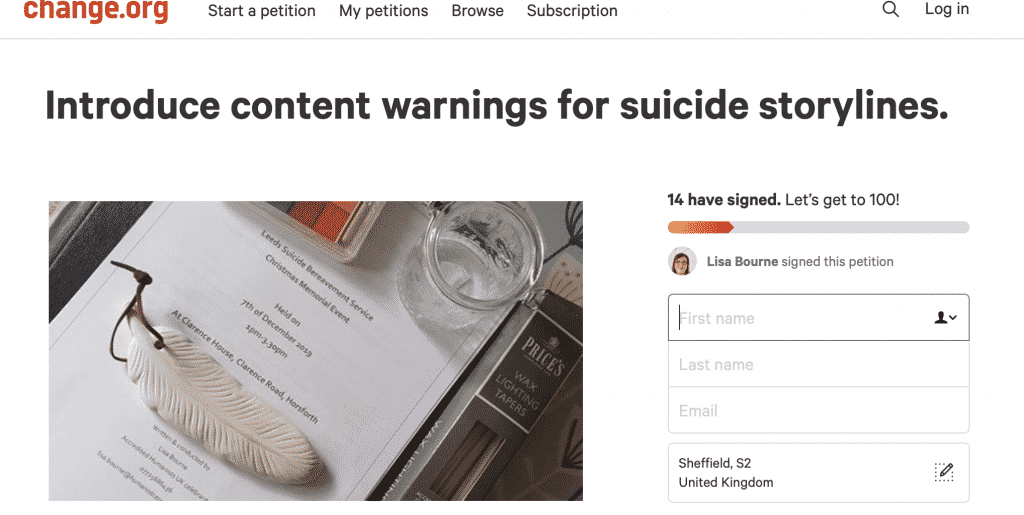For those, like myself, who are bereaved by suicide, coming across a storyline featuring death by suicide, suicide preparation or suicidal thoughts is extremely uncomfortable. Not least because those bereaved by suicide are at a higher risk of suicide themselves. And of course, those who live with mental illness and/or suicidal thoughts can find these storylines triggering too...
Writes Lisa Bourne, a Mental health activist and volunteer (Time To Change Champion, founder of Mental Wellbeing Meetups, trustee and director of Leeds Survivor-Led Crisis and volunteer for Leeds Suicide Bereavement Service), for Mama Mei….
Opinions are my own and in no way affiliated with the organisations I volunteer for.
Open Letter To Media, Writers, Journalists, Publishers regarding the introduction of detailed trigger warnings.
Suicide storylines are everywhere at the moment. This is important in raising awareness of suicide, in improving understanding around mental health and mental illness and reducing stigma and discrimination.
For those, like myself, who are bereaved by suicide, coming across a storyline featuring death by suicide, suicide preparation or suicidal thoughts is extremely uncomfortable. Not least because those bereaved by suicide are at a higher risk of suicide themselves. And of course, those who live with mental illness and/or suicidal thoughts can find these storylines triggering too.
I watch and read a lot of true crime and crime fiction, so wishy washy warnings like “programme may contain upsetting scenes” never concern me. I love a bit of Silent Witness for example and the gore never upsets me!
However, unexpectedly finding a storyline turning to suicide is enough to trigger my nightmares and grief. It is something I live with and I’m sure I am not alone in that. It happened again recently after reading a particular chapter in Elinor Oliphant is Completely Fineby Gail Honeyman but I do not wish to list the details of the nightmare here.
What I would love to see is detailed trigger warnings, for example, “this programme contains a storyline based on suicide”. I know that storylines around suicide are often researched and created in conjunction with charities like Mind to ensure they are realistic and sympathetic rather than sensationalist. But if those who work in media, journalism, creative arts and so on could research and understand the effects of portraying suicide storylines on vulnerable audience members too that would be an excellent step forward.
In 2018, there were 6,507 recorded deaths by suicide in the UK1. Now think of all the family members, friends, colleagues and acquaintances that may have been affected by those 6,507 deaths. Add to that number the 1 in 4 people living with mental illness2, the 1 in 5 experiencing suicidal thoughts3and the 1 in 20 who have attempted suicide4in the last year. That is a lot of vulnerable people.
In my work life I am an endorser of the Mental Health Media Charter and I am very proud to say that the MHMC and its founder, Natasha Devon MBE, are supportive of this petition. You can find out more about the MHMC and its mission statement here:
https://www.natashadevon.com/the-mental-health-media-charter
Please consider the introduction of detailed trigger warnings on book covers and on TV shows and films.
I realise that detailed trigger warnings do not ease grief or make the bereaved feel better but audiences can make informed decisions and protect their mental health. Such a small gesture would make a massive impact and promote a kind and positive change in how we as a country address mental health, suicide and bereavement.

You can find my petition link here:
Side note – I initially wrote this on the 14thof February, created the petition, and after receiving a very unpleasant comment on facebook the next day, I decided to sign out of social media for a while. Later that day, the news broke of the death of TV presenter Caroline Flack. It all highlighted the lack of knowledge of how suicide bereavement can affect people, the irresponsible coverage of a death by suicide and the lack of consideration that the impact that this type of coverage can have on viewers and readers.
Signing out of social media is a way of protecting my mental health just the same as opting out of watching a TV show or reading a book after seeing a trigger warning.
Source for statistics
